Analyzing Professional Practices in Education and Training Field
VerifiedAdded on 2023/06/08
|20
|6303
|436
Report
AI Summary
This report provides a comprehensive overview of professional practices in education and training. It defines professionalism and dual professionalism, emphasizing the importance of values like honesty, integrity, and fairness in teaching. The report examines the influence of social, political, and economic factors on educational policy and its impact on curriculum and practice, particularly in marketing. It discusses the roles of stakeholders, including students, teachers, administrators, policymakers, and parents, as well as external bodies like schools and universities, highlighting the importance of accountability and partnership. Furthermore, the report explains key aspects of organizational policies and codes of practice, evaluating quality improvement and assurance arrangements, self-assessment, and the quality cycle, concluding with an analysis of areas for improvement within learning programs.
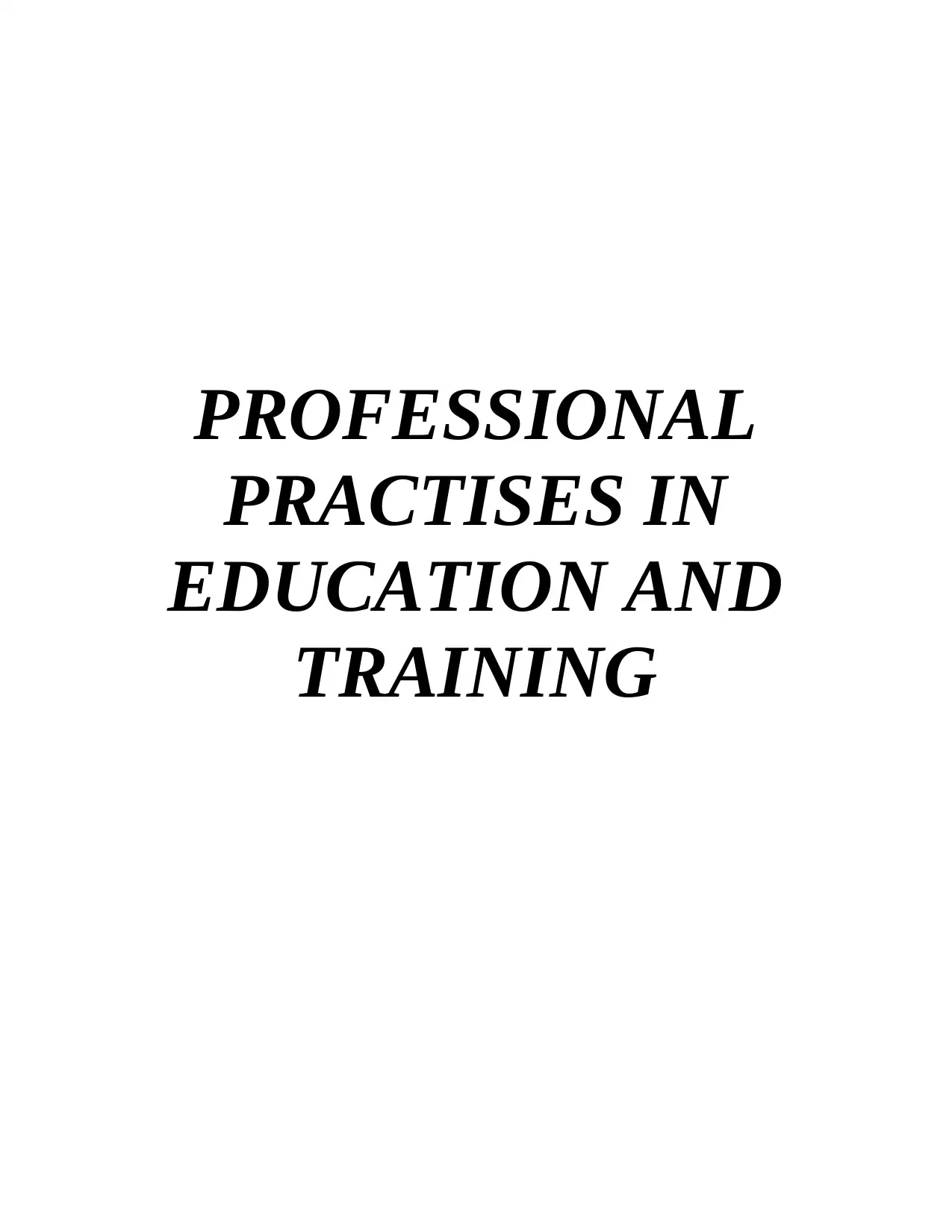
PROFESSIONAL
PRACTISES IN
EDUCATION AND
TRAINING
PRACTISES IN
EDUCATION AND
TRAINING
Paraphrase This Document
Need a fresh take? Get an instant paraphrase of this document with our AI Paraphraser
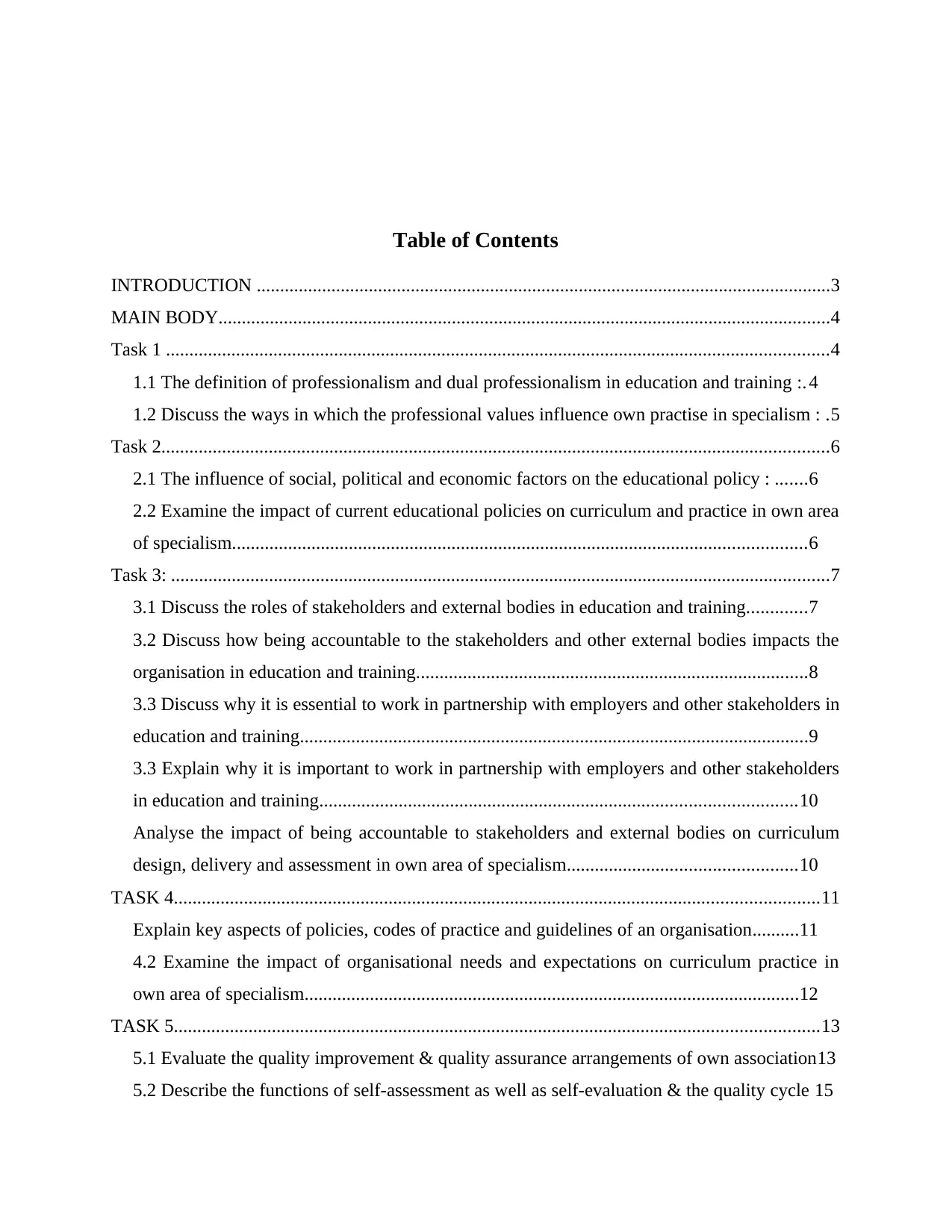
Table of Contents
INTRODUCTION ...........................................................................................................................3
MAIN BODY...................................................................................................................................4
Task 1 ..............................................................................................................................................4
1.1 The definition of professionalism and dual professionalism in education and training :. 4
1.2 Discuss the ways in which the professional values influence own practise in specialism : .5
Task 2...............................................................................................................................................6
2.1 The influence of social, political and economic factors on the educational policy : .......6
2.2 Examine the impact of current educational policies on curriculum and practice in own area
of specialism...........................................................................................................................6
Task 3: .............................................................................................................................................7
3.1 Discuss the roles of stakeholders and external bodies in education and training.............7
3.2 Discuss how being accountable to the stakeholders and other external bodies impacts the
organisation in education and training....................................................................................8
3.3 Discuss why it is essential to work in partnership with employers and other stakeholders in
education and training.............................................................................................................9
3.3 Explain why it is important to work in partnership with employers and other stakeholders
in education and training......................................................................................................10
Analyse the impact of being accountable to stakeholders and external bodies on curriculum
design, delivery and assessment in own area of specialism.................................................10
TASK 4..........................................................................................................................................11
Explain key aspects of policies, codes of practice and guidelines of an organisation..........11
4.2 Examine the impact of organisational needs and expectations on curriculum practice in
own area of specialism..........................................................................................................12
TASK 5..........................................................................................................................................13
5.1 Evaluate the quality improvement & quality assurance arrangements of own association13
5.2 Describe the functions of self-assessment as well as self-evaluation & the quality cycle 15
INTRODUCTION ...........................................................................................................................3
MAIN BODY...................................................................................................................................4
Task 1 ..............................................................................................................................................4
1.1 The definition of professionalism and dual professionalism in education and training :. 4
1.2 Discuss the ways in which the professional values influence own practise in specialism : .5
Task 2...............................................................................................................................................6
2.1 The influence of social, political and economic factors on the educational policy : .......6
2.2 Examine the impact of current educational policies on curriculum and practice in own area
of specialism...........................................................................................................................6
Task 3: .............................................................................................................................................7
3.1 Discuss the roles of stakeholders and external bodies in education and training.............7
3.2 Discuss how being accountable to the stakeholders and other external bodies impacts the
organisation in education and training....................................................................................8
3.3 Discuss why it is essential to work in partnership with employers and other stakeholders in
education and training.............................................................................................................9
3.3 Explain why it is important to work in partnership with employers and other stakeholders
in education and training......................................................................................................10
Analyse the impact of being accountable to stakeholders and external bodies on curriculum
design, delivery and assessment in own area of specialism.................................................10
TASK 4..........................................................................................................................................11
Explain key aspects of policies, codes of practice and guidelines of an organisation..........11
4.2 Examine the impact of organisational needs and expectations on curriculum practice in
own area of specialism..........................................................................................................12
TASK 5..........................................................................................................................................13
5.1 Evaluate the quality improvement & quality assurance arrangements of own association13
5.2 Describe the functions of self-assessment as well as self-evaluation & the quality cycle 15
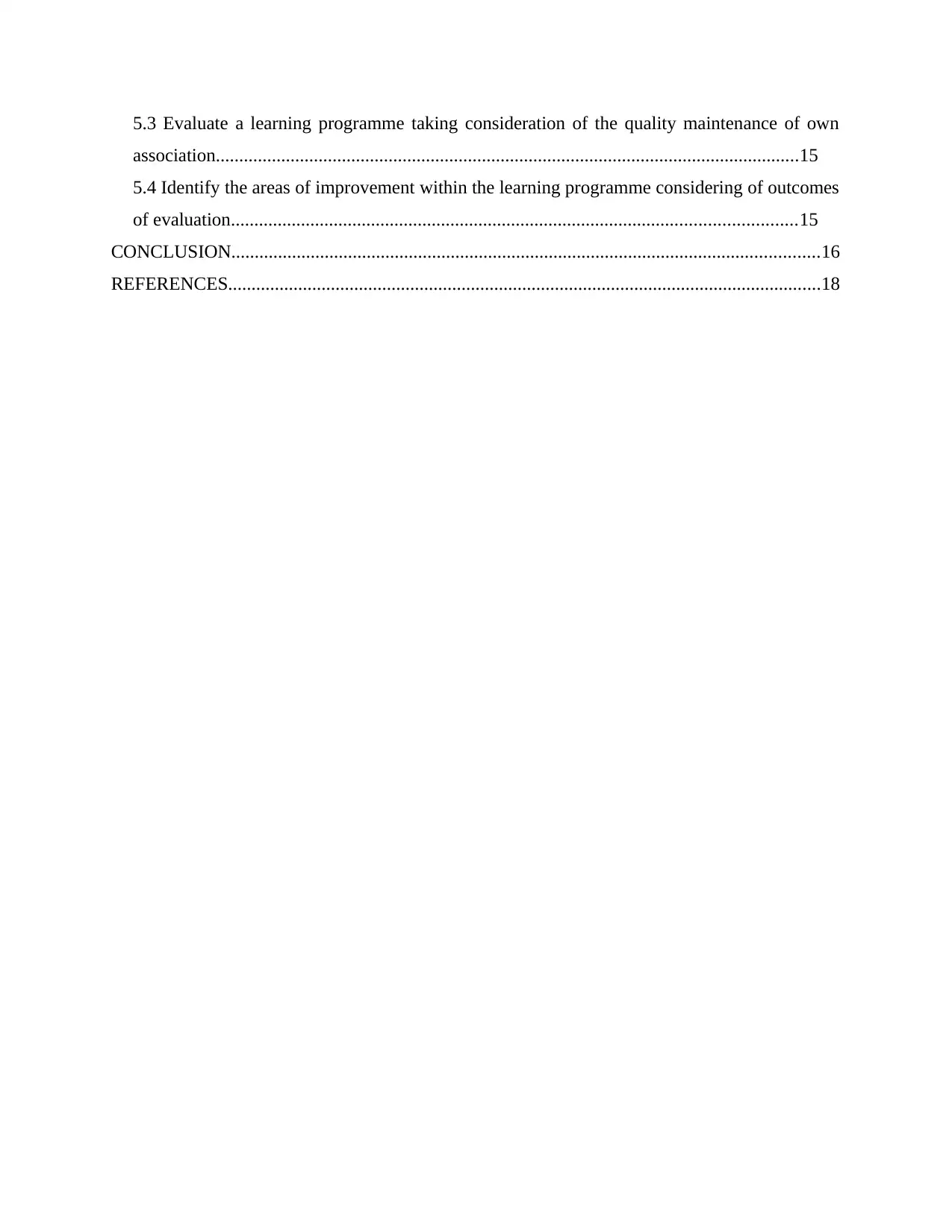
5.3 Evaluate a learning programme taking consideration of the quality maintenance of own
association.............................................................................................................................15
5.4 Identify the areas of improvement within the learning programme considering of outcomes
of evaluation.........................................................................................................................15
CONCLUSION..............................................................................................................................16
REFERENCES...............................................................................................................................18
association.............................................................................................................................15
5.4 Identify the areas of improvement within the learning programme considering of outcomes
of evaluation.........................................................................................................................15
CONCLUSION..............................................................................................................................16
REFERENCES...............................................................................................................................18
⊘ This is a preview!⊘
Do you want full access?
Subscribe today to unlock all pages.

Trusted by 1+ million students worldwide
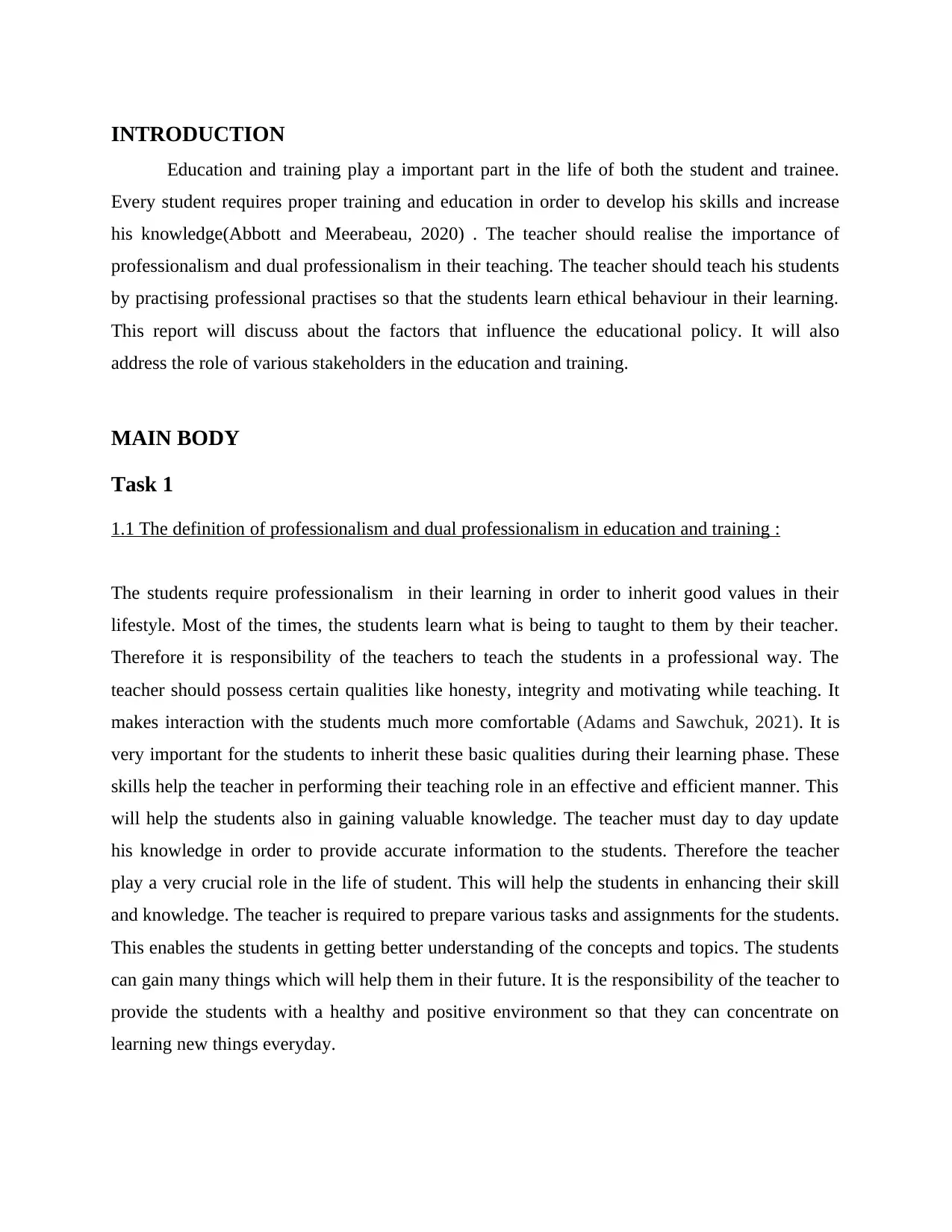
INTRODUCTION
Education and training play a important part in the life of both the student and trainee.
Every student requires proper training and education in order to develop his skills and increase
his knowledge(Abbott and Meerabeau, 2020) . The teacher should realise the importance of
professionalism and dual professionalism in their teaching. The teacher should teach his students
by practising professional practises so that the students learn ethical behaviour in their learning.
This report will discuss about the factors that influence the educational policy. It will also
address the role of various stakeholders in the education and training.
MAIN BODY
Task 1
1.1 The definition of professionalism and dual professionalism in education and training :
The students require professionalism in their learning in order to inherit good values in their
lifestyle. Most of the times, the students learn what is being to taught to them by their teacher.
Therefore it is responsibility of the teachers to teach the students in a professional way. The
teacher should possess certain qualities like honesty, integrity and motivating while teaching. It
makes interaction with the students much more comfortable (Adams and Sawchuk, 2021). It is
very important for the students to inherit these basic qualities during their learning phase. These
skills help the teacher in performing their teaching role in an effective and efficient manner. This
will help the students also in gaining valuable knowledge. The teacher must day to day update
his knowledge in order to provide accurate information to the students. Therefore the teacher
play a very crucial role in the life of student. This will help the students in enhancing their skill
and knowledge. The teacher is required to prepare various tasks and assignments for the students.
This enables the students in getting better understanding of the concepts and topics. The students
can gain many things which will help them in their future. It is the responsibility of the teacher to
provide the students with a healthy and positive environment so that they can concentrate on
learning new things everyday.
Education and training play a important part in the life of both the student and trainee.
Every student requires proper training and education in order to develop his skills and increase
his knowledge(Abbott and Meerabeau, 2020) . The teacher should realise the importance of
professionalism and dual professionalism in their teaching. The teacher should teach his students
by practising professional practises so that the students learn ethical behaviour in their learning.
This report will discuss about the factors that influence the educational policy. It will also
address the role of various stakeholders in the education and training.
MAIN BODY
Task 1
1.1 The definition of professionalism and dual professionalism in education and training :
The students require professionalism in their learning in order to inherit good values in their
lifestyle. Most of the times, the students learn what is being to taught to them by their teacher.
Therefore it is responsibility of the teachers to teach the students in a professional way. The
teacher should possess certain qualities like honesty, integrity and motivating while teaching. It
makes interaction with the students much more comfortable (Adams and Sawchuk, 2021). It is
very important for the students to inherit these basic qualities during their learning phase. These
skills help the teacher in performing their teaching role in an effective and efficient manner. This
will help the students also in gaining valuable knowledge. The teacher must day to day update
his knowledge in order to provide accurate information to the students. Therefore the teacher
play a very crucial role in the life of student. This will help the students in enhancing their skill
and knowledge. The teacher is required to prepare various tasks and assignments for the students.
This enables the students in getting better understanding of the concepts and topics. The students
can gain many things which will help them in their future. It is the responsibility of the teacher to
provide the students with a healthy and positive environment so that they can concentrate on
learning new things everyday.
Paraphrase This Document
Need a fresh take? Get an instant paraphrase of this document with our AI Paraphraser
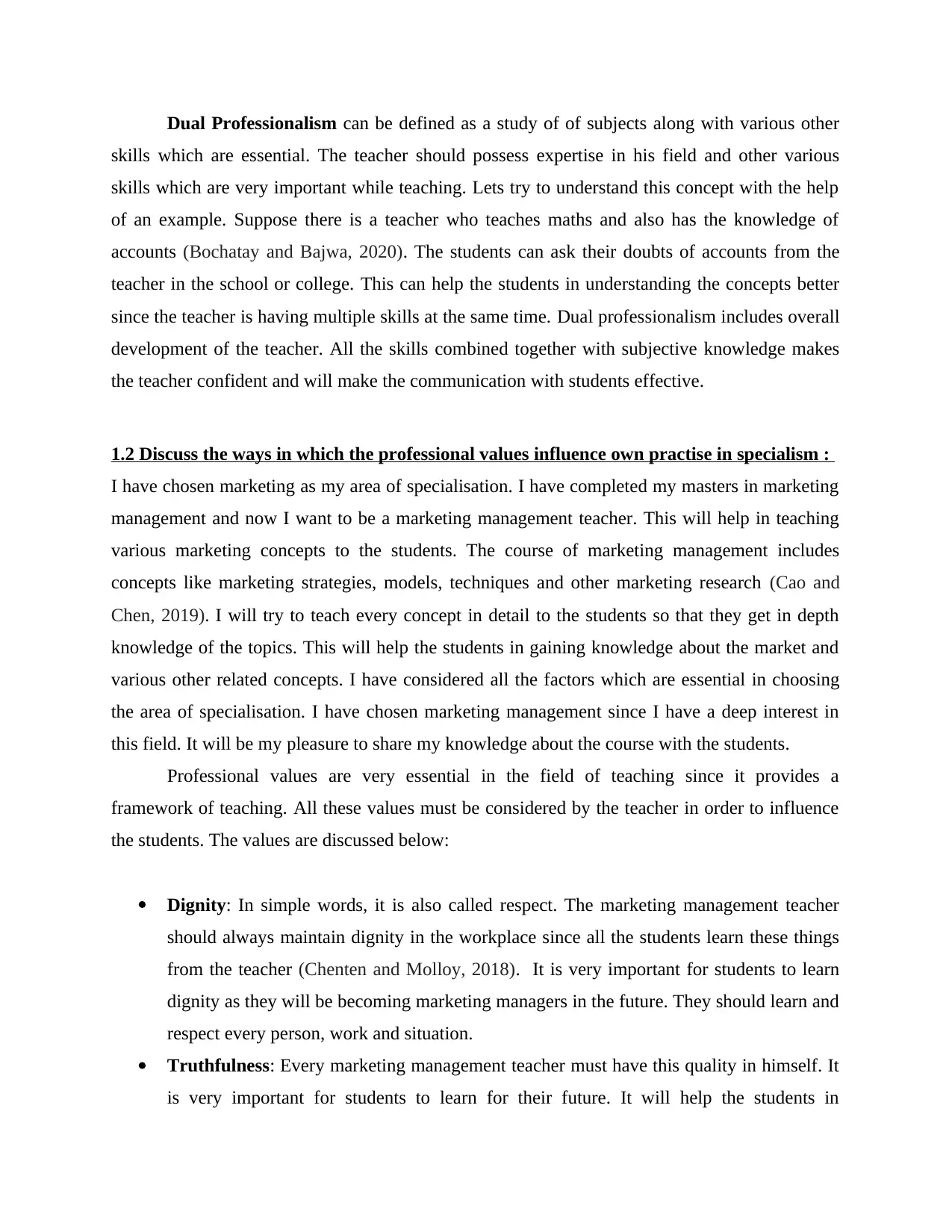
Dual Professionalism can be defined as a study of of subjects along with various other
skills which are essential. The teacher should possess expertise in his field and other various
skills which are very important while teaching. Lets try to understand this concept with the help
of an example. Suppose there is a teacher who teaches maths and also has the knowledge of
accounts (Bochatay and Bajwa, 2020). The students can ask their doubts of accounts from the
teacher in the school or college. This can help the students in understanding the concepts better
since the teacher is having multiple skills at the same time. Dual professionalism includes overall
development of the teacher. All the skills combined together with subjective knowledge makes
the teacher confident and will make the communication with students effective.
1.2 Discuss the ways in which the professional values influence own practise in specialism :
I have chosen marketing as my area of specialisation. I have completed my masters in marketing
management and now I want to be a marketing management teacher. This will help in teaching
various marketing concepts to the students. The course of marketing management includes
concepts like marketing strategies, models, techniques and other marketing research (Cao and
Chen, 2019). I will try to teach every concept in detail to the students so that they get in depth
knowledge of the topics. This will help the students in gaining knowledge about the market and
various other related concepts. I have considered all the factors which are essential in choosing
the area of specialisation. I have chosen marketing management since I have a deep interest in
this field. It will be my pleasure to share my knowledge about the course with the students.
Professional values are very essential in the field of teaching since it provides a
framework of teaching. All these values must be considered by the teacher in order to influence
the students. The values are discussed below:
Dignity: In simple words, it is also called respect. The marketing management teacher
should always maintain dignity in the workplace since all the students learn these things
from the teacher (Chenten and Molloy, 2018). It is very important for students to learn
dignity as they will be becoming marketing managers in the future. They should learn and
respect every person, work and situation.
Truthfulness: Every marketing management teacher must have this quality in himself. It
is very important for students to learn for their future. It will help the students in
skills which are essential. The teacher should possess expertise in his field and other various
skills which are very important while teaching. Lets try to understand this concept with the help
of an example. Suppose there is a teacher who teaches maths and also has the knowledge of
accounts (Bochatay and Bajwa, 2020). The students can ask their doubts of accounts from the
teacher in the school or college. This can help the students in understanding the concepts better
since the teacher is having multiple skills at the same time. Dual professionalism includes overall
development of the teacher. All the skills combined together with subjective knowledge makes
the teacher confident and will make the communication with students effective.
1.2 Discuss the ways in which the professional values influence own practise in specialism :
I have chosen marketing as my area of specialisation. I have completed my masters in marketing
management and now I want to be a marketing management teacher. This will help in teaching
various marketing concepts to the students. The course of marketing management includes
concepts like marketing strategies, models, techniques and other marketing research (Cao and
Chen, 2019). I will try to teach every concept in detail to the students so that they get in depth
knowledge of the topics. This will help the students in gaining knowledge about the market and
various other related concepts. I have considered all the factors which are essential in choosing
the area of specialisation. I have chosen marketing management since I have a deep interest in
this field. It will be my pleasure to share my knowledge about the course with the students.
Professional values are very essential in the field of teaching since it provides a
framework of teaching. All these values must be considered by the teacher in order to influence
the students. The values are discussed below:
Dignity: In simple words, it is also called respect. The marketing management teacher
should always maintain dignity in the workplace since all the students learn these things
from the teacher (Chenten and Molloy, 2018). It is very important for students to learn
dignity as they will be becoming marketing managers in the future. They should learn and
respect every person, work and situation.
Truthfulness: Every marketing management teacher must have this quality in himself. It
is very important for students to learn for their future. It will help the students in
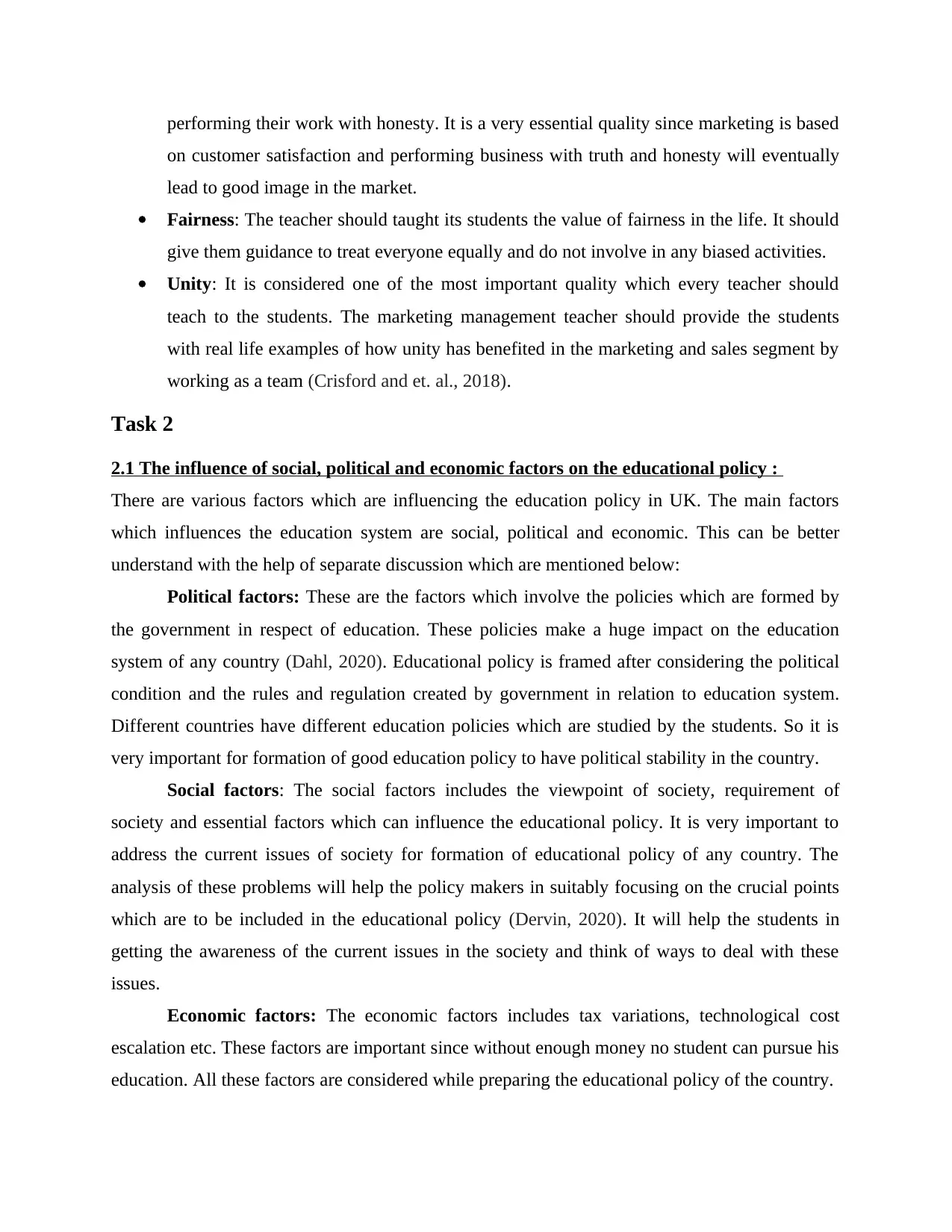
performing their work with honesty. It is a very essential quality since marketing is based
on customer satisfaction and performing business with truth and honesty will eventually
lead to good image in the market.
Fairness: The teacher should taught its students the value of fairness in the life. It should
give them guidance to treat everyone equally and do not involve in any biased activities.
Unity: It is considered one of the most important quality which every teacher should
teach to the students. The marketing management teacher should provide the students
with real life examples of how unity has benefited in the marketing and sales segment by
working as a team (Crisford and et. al., 2018).
Task 2
2.1 The influence of social, political and economic factors on the educational policy :
There are various factors which are influencing the education policy in UK. The main factors
which influences the education system are social, political and economic. This can be better
understand with the help of separate discussion which are mentioned below:
Political factors: These are the factors which involve the policies which are formed by
the government in respect of education. These policies make a huge impact on the education
system of any country (Dahl, 2020). Educational policy is framed after considering the political
condition and the rules and regulation created by government in relation to education system.
Different countries have different education policies which are studied by the students. So it is
very important for formation of good education policy to have political stability in the country.
Social factors: The social factors includes the viewpoint of society, requirement of
society and essential factors which can influence the educational policy. It is very important to
address the current issues of society for formation of educational policy of any country. The
analysis of these problems will help the policy makers in suitably focusing on the crucial points
which are to be included in the educational policy (Dervin, 2020). It will help the students in
getting the awareness of the current issues in the society and think of ways to deal with these
issues.
Economic factors: The economic factors includes tax variations, technological cost
escalation etc. These factors are important since without enough money no student can pursue his
education. All these factors are considered while preparing the educational policy of the country.
on customer satisfaction and performing business with truth and honesty will eventually
lead to good image in the market.
Fairness: The teacher should taught its students the value of fairness in the life. It should
give them guidance to treat everyone equally and do not involve in any biased activities.
Unity: It is considered one of the most important quality which every teacher should
teach to the students. The marketing management teacher should provide the students
with real life examples of how unity has benefited in the marketing and sales segment by
working as a team (Crisford and et. al., 2018).
Task 2
2.1 The influence of social, political and economic factors on the educational policy :
There are various factors which are influencing the education policy in UK. The main factors
which influences the education system are social, political and economic. This can be better
understand with the help of separate discussion which are mentioned below:
Political factors: These are the factors which involve the policies which are formed by
the government in respect of education. These policies make a huge impact on the education
system of any country (Dahl, 2020). Educational policy is framed after considering the political
condition and the rules and regulation created by government in relation to education system.
Different countries have different education policies which are studied by the students. So it is
very important for formation of good education policy to have political stability in the country.
Social factors: The social factors includes the viewpoint of society, requirement of
society and essential factors which can influence the educational policy. It is very important to
address the current issues of society for formation of educational policy of any country. The
analysis of these problems will help the policy makers in suitably focusing on the crucial points
which are to be included in the educational policy (Dervin, 2020). It will help the students in
getting the awareness of the current issues in the society and think of ways to deal with these
issues.
Economic factors: The economic factors includes tax variations, technological cost
escalation etc. These factors are important since without enough money no student can pursue his
education. All these factors are considered while preparing the educational policy of the country.
⊘ This is a preview!⊘
Do you want full access?
Subscribe today to unlock all pages.

Trusted by 1+ million students worldwide
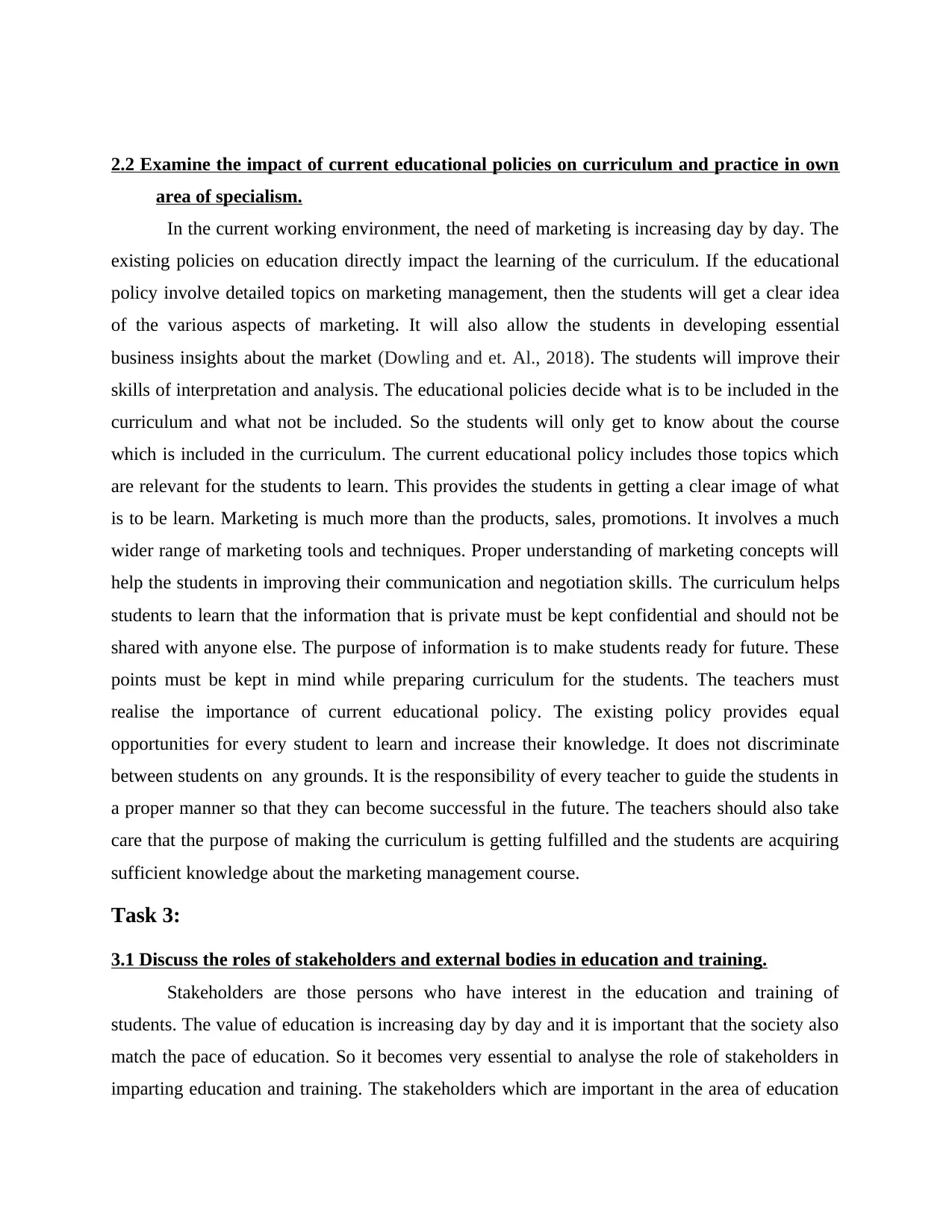
2.2 Examine the impact of current educational policies on curriculum and practice in own
area of specialism.
In the current working environment, the need of marketing is increasing day by day. The
existing policies on education directly impact the learning of the curriculum. If the educational
policy involve detailed topics on marketing management, then the students will get a clear idea
of the various aspects of marketing. It will also allow the students in developing essential
business insights about the market (Dowling and et. Al., 2018). The students will improve their
skills of interpretation and analysis. The educational policies decide what is to be included in the
curriculum and what not be included. So the students will only get to know about the course
which is included in the curriculum. The current educational policy includes those topics which
are relevant for the students to learn. This provides the students in getting a clear image of what
is to be learn. Marketing is much more than the products, sales, promotions. It involves a much
wider range of marketing tools and techniques. Proper understanding of marketing concepts will
help the students in improving their communication and negotiation skills. The curriculum helps
students to learn that the information that is private must be kept confidential and should not be
shared with anyone else. The purpose of information is to make students ready for future. These
points must be kept in mind while preparing curriculum for the students. The teachers must
realise the importance of current educational policy. The existing policy provides equal
opportunities for every student to learn and increase their knowledge. It does not discriminate
between students on any grounds. It is the responsibility of every teacher to guide the students in
a proper manner so that they can become successful in the future. The teachers should also take
care that the purpose of making the curriculum is getting fulfilled and the students are acquiring
sufficient knowledge about the marketing management course.
Task 3:
3.1 Discuss the roles of stakeholders and external bodies in education and training.
Stakeholders are those persons who have interest in the education and training of
students. The value of education is increasing day by day and it is important that the society also
match the pace of education. So it becomes very essential to analyse the role of stakeholders in
imparting education and training. The stakeholders which are important in the area of education
area of specialism.
In the current working environment, the need of marketing is increasing day by day. The
existing policies on education directly impact the learning of the curriculum. If the educational
policy involve detailed topics on marketing management, then the students will get a clear idea
of the various aspects of marketing. It will also allow the students in developing essential
business insights about the market (Dowling and et. Al., 2018). The students will improve their
skills of interpretation and analysis. The educational policies decide what is to be included in the
curriculum and what not be included. So the students will only get to know about the course
which is included in the curriculum. The current educational policy includes those topics which
are relevant for the students to learn. This provides the students in getting a clear image of what
is to be learn. Marketing is much more than the products, sales, promotions. It involves a much
wider range of marketing tools and techniques. Proper understanding of marketing concepts will
help the students in improving their communication and negotiation skills. The curriculum helps
students to learn that the information that is private must be kept confidential and should not be
shared with anyone else. The purpose of information is to make students ready for future. These
points must be kept in mind while preparing curriculum for the students. The teachers must
realise the importance of current educational policy. The existing policy provides equal
opportunities for every student to learn and increase their knowledge. It does not discriminate
between students on any grounds. It is the responsibility of every teacher to guide the students in
a proper manner so that they can become successful in the future. The teachers should also take
care that the purpose of making the curriculum is getting fulfilled and the students are acquiring
sufficient knowledge about the marketing management course.
Task 3:
3.1 Discuss the roles of stakeholders and external bodies in education and training.
Stakeholders are those persons who have interest in the education and training of
students. The value of education is increasing day by day and it is important that the society also
match the pace of education. So it becomes very essential to analyse the role of stakeholders in
imparting education and training. The stakeholders which are important in the area of education
Paraphrase This Document
Need a fresh take? Get an instant paraphrase of this document with our AI Paraphraser
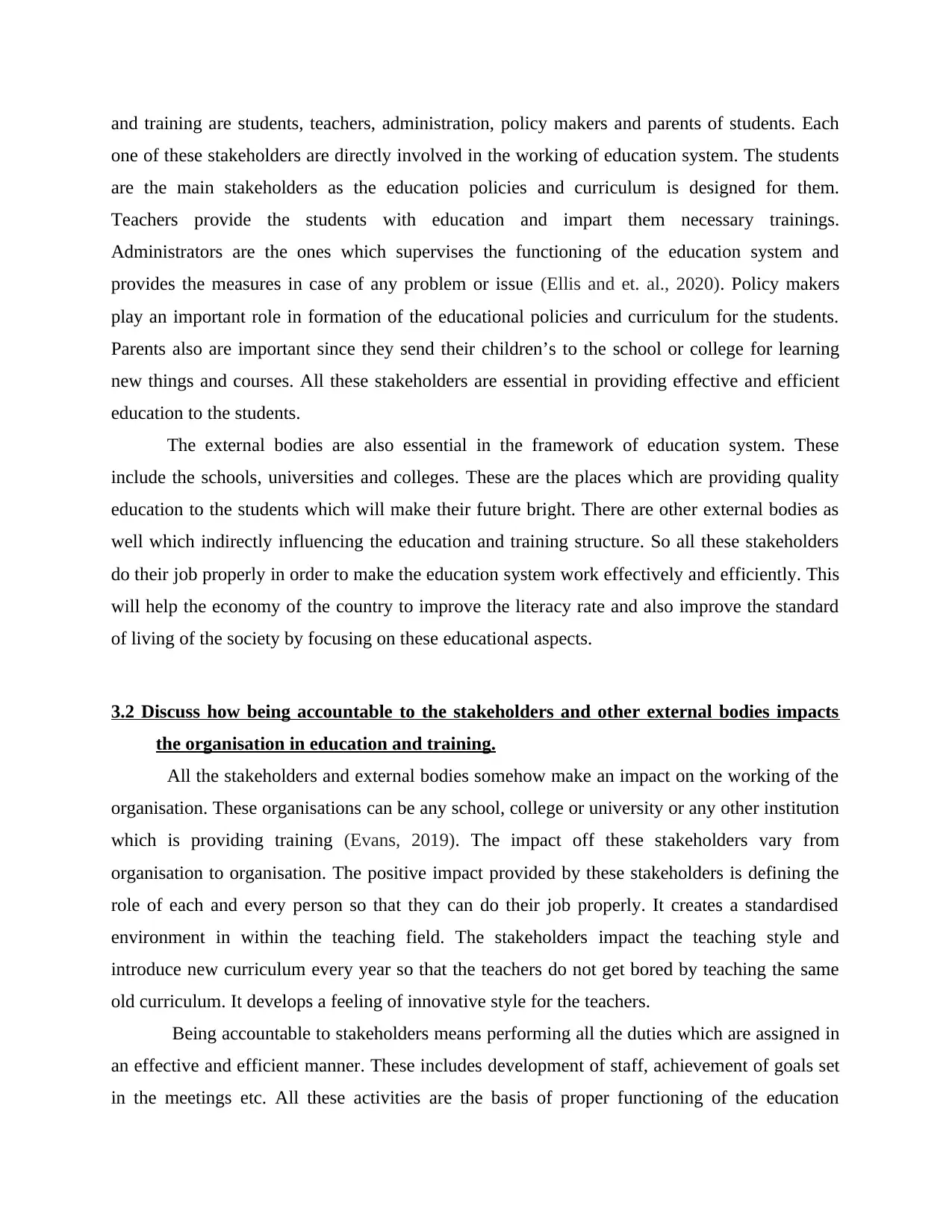
and training are students, teachers, administration, policy makers and parents of students. Each
one of these stakeholders are directly involved in the working of education system. The students
are the main stakeholders as the education policies and curriculum is designed for them.
Teachers provide the students with education and impart them necessary trainings.
Administrators are the ones which supervises the functioning of the education system and
provides the measures in case of any problem or issue (Ellis and et. al., 2020). Policy makers
play an important role in formation of the educational policies and curriculum for the students.
Parents also are important since they send their children’s to the school or college for learning
new things and courses. All these stakeholders are essential in providing effective and efficient
education to the students.
The external bodies are also essential in the framework of education system. These
include the schools, universities and colleges. These are the places which are providing quality
education to the students which will make their future bright. There are other external bodies as
well which indirectly influencing the education and training structure. So all these stakeholders
do their job properly in order to make the education system work effectively and efficiently. This
will help the economy of the country to improve the literacy rate and also improve the standard
of living of the society by focusing on these educational aspects.
3.2 Discuss how being accountable to the stakeholders and other external bodies impacts
the organisation in education and training.
All the stakeholders and external bodies somehow make an impact on the working of the
organisation. These organisations can be any school, college or university or any other institution
which is providing training (Evans, 2019). The impact off these stakeholders vary from
organisation to organisation. The positive impact provided by these stakeholders is defining the
role of each and every person so that they can do their job properly. It creates a standardised
environment in within the teaching field. The stakeholders impact the teaching style and
introduce new curriculum every year so that the teachers do not get bored by teaching the same
old curriculum. It develops a feeling of innovative style for the teachers.
Being accountable to stakeholders means performing all the duties which are assigned in
an effective and efficient manner. These includes development of staff, achievement of goals set
in the meetings etc. All these activities are the basis of proper functioning of the education
one of these stakeholders are directly involved in the working of education system. The students
are the main stakeholders as the education policies and curriculum is designed for them.
Teachers provide the students with education and impart them necessary trainings.
Administrators are the ones which supervises the functioning of the education system and
provides the measures in case of any problem or issue (Ellis and et. al., 2020). Policy makers
play an important role in formation of the educational policies and curriculum for the students.
Parents also are important since they send their children’s to the school or college for learning
new things and courses. All these stakeholders are essential in providing effective and efficient
education to the students.
The external bodies are also essential in the framework of education system. These
include the schools, universities and colleges. These are the places which are providing quality
education to the students which will make their future bright. There are other external bodies as
well which indirectly influencing the education and training structure. So all these stakeholders
do their job properly in order to make the education system work effectively and efficiently. This
will help the economy of the country to improve the literacy rate and also improve the standard
of living of the society by focusing on these educational aspects.
3.2 Discuss how being accountable to the stakeholders and other external bodies impacts
the organisation in education and training.
All the stakeholders and external bodies somehow make an impact on the working of the
organisation. These organisations can be any school, college or university or any other institution
which is providing training (Evans, 2019). The impact off these stakeholders vary from
organisation to organisation. The positive impact provided by these stakeholders is defining the
role of each and every person so that they can do their job properly. It creates a standardised
environment in within the teaching field. The stakeholders impact the teaching style and
introduce new curriculum every year so that the teachers do not get bored by teaching the same
old curriculum. It develops a feeling of innovative style for the teachers.
Being accountable to stakeholders means performing all the duties which are assigned in
an effective and efficient manner. These includes development of staff, achievement of goals set
in the meetings etc. All these activities are the basis of proper functioning of the education
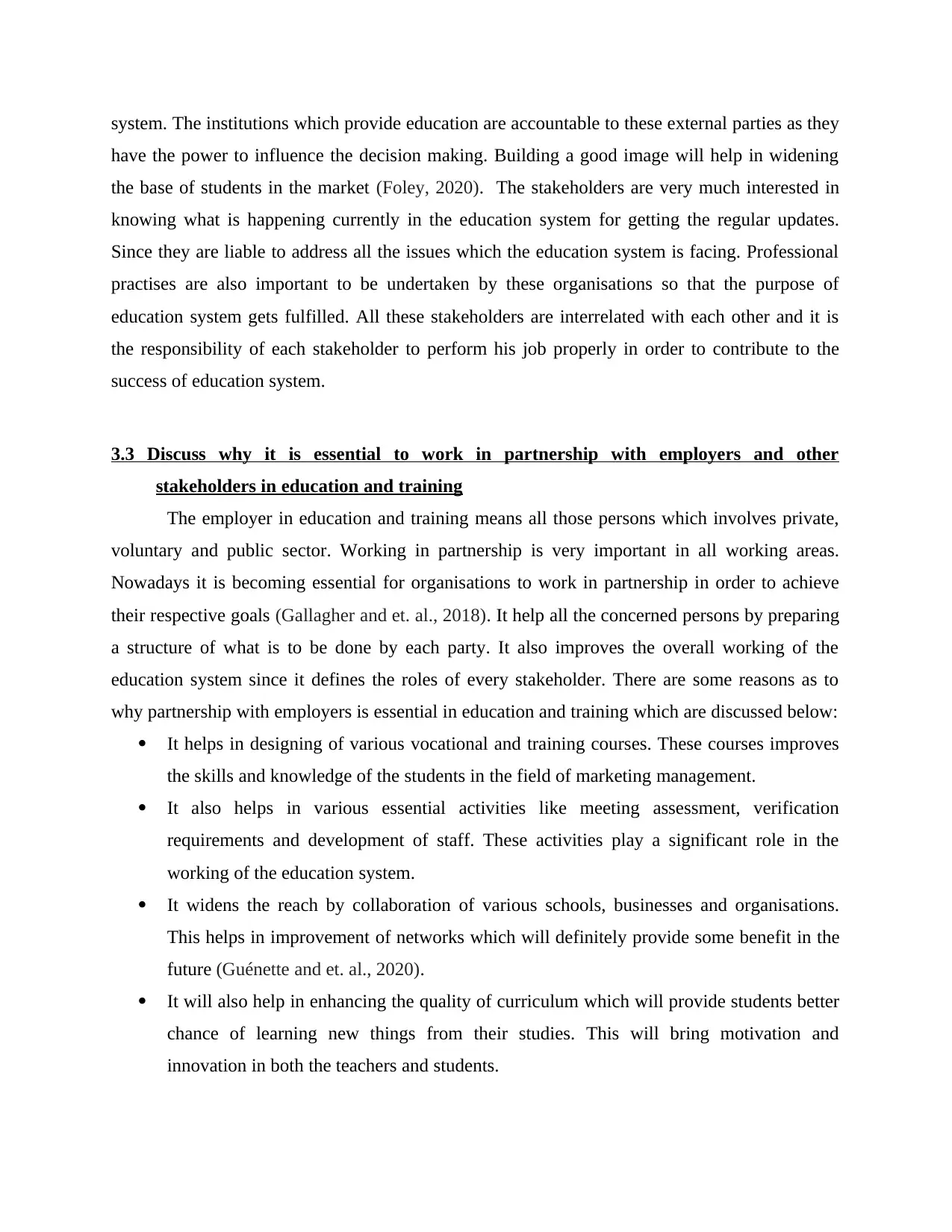
system. The institutions which provide education are accountable to these external parties as they
have the power to influence the decision making. Building a good image will help in widening
the base of students in the market (Foley, 2020). The stakeholders are very much interested in
knowing what is happening currently in the education system for getting the regular updates.
Since they are liable to address all the issues which the education system is facing. Professional
practises are also important to be undertaken by these organisations so that the purpose of
education system gets fulfilled. All these stakeholders are interrelated with each other and it is
the responsibility of each stakeholder to perform his job properly in order to contribute to the
success of education system.
3.3 Discuss why it is essential to work in partnership with employers and other
stakeholders in education and training
The employer in education and training means all those persons which involves private,
voluntary and public sector. Working in partnership is very important in all working areas.
Nowadays it is becoming essential for organisations to work in partnership in order to achieve
their respective goals (Gallagher and et. al., 2018). It help all the concerned persons by preparing
a structure of what is to be done by each party. It also improves the overall working of the
education system since it defines the roles of every stakeholder. There are some reasons as to
why partnership with employers is essential in education and training which are discussed below:
It helps in designing of various vocational and training courses. These courses improves
the skills and knowledge of the students in the field of marketing management.
It also helps in various essential activities like meeting assessment, verification
requirements and development of staff. These activities play a significant role in the
working of the education system.
It widens the reach by collaboration of various schools, businesses and organisations.
This helps in improvement of networks which will definitely provide some benefit in the
future (Guénette and et. al., 2020).
It will also help in enhancing the quality of curriculum which will provide students better
chance of learning new things from their studies. This will bring motivation and
innovation in both the teachers and students.
have the power to influence the decision making. Building a good image will help in widening
the base of students in the market (Foley, 2020). The stakeholders are very much interested in
knowing what is happening currently in the education system for getting the regular updates.
Since they are liable to address all the issues which the education system is facing. Professional
practises are also important to be undertaken by these organisations so that the purpose of
education system gets fulfilled. All these stakeholders are interrelated with each other and it is
the responsibility of each stakeholder to perform his job properly in order to contribute to the
success of education system.
3.3 Discuss why it is essential to work in partnership with employers and other
stakeholders in education and training
The employer in education and training means all those persons which involves private,
voluntary and public sector. Working in partnership is very important in all working areas.
Nowadays it is becoming essential for organisations to work in partnership in order to achieve
their respective goals (Gallagher and et. al., 2018). It help all the concerned persons by preparing
a structure of what is to be done by each party. It also improves the overall working of the
education system since it defines the roles of every stakeholder. There are some reasons as to
why partnership with employers is essential in education and training which are discussed below:
It helps in designing of various vocational and training courses. These courses improves
the skills and knowledge of the students in the field of marketing management.
It also helps in various essential activities like meeting assessment, verification
requirements and development of staff. These activities play a significant role in the
working of the education system.
It widens the reach by collaboration of various schools, businesses and organisations.
This helps in improvement of networks which will definitely provide some benefit in the
future (Guénette and et. al., 2020).
It will also help in enhancing the quality of curriculum which will provide students better
chance of learning new things from their studies. This will bring motivation and
innovation in both the teachers and students.
⊘ This is a preview!⊘
Do you want full access?
Subscribe today to unlock all pages.

Trusted by 1+ million students worldwide
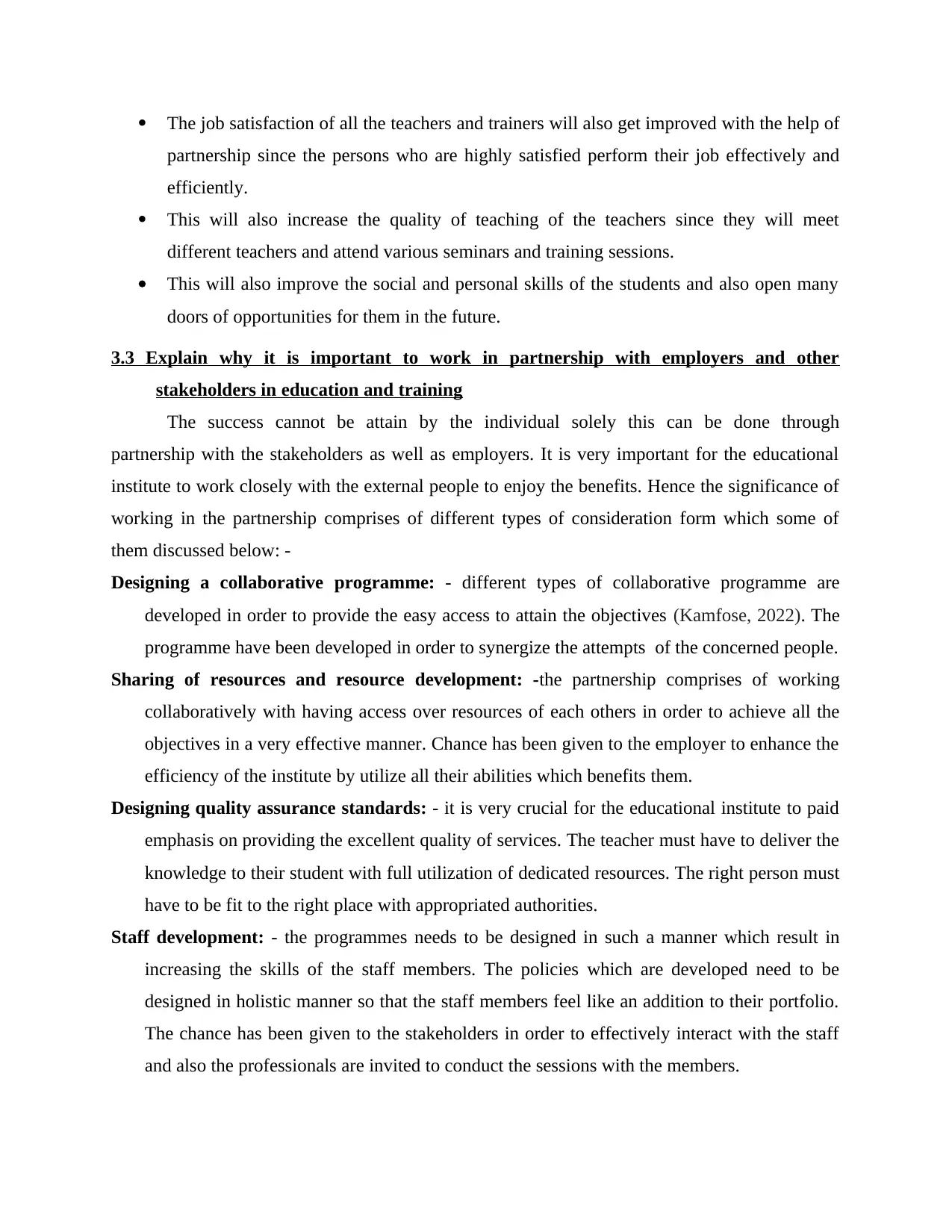
The job satisfaction of all the teachers and trainers will also get improved with the help of
partnership since the persons who are highly satisfied perform their job effectively and
efficiently.
This will also increase the quality of teaching of the teachers since they will meet
different teachers and attend various seminars and training sessions.
This will also improve the social and personal skills of the students and also open many
doors of opportunities for them in the future.
3.3 Explain why it is important to work in partnership with employers and other
stakeholders in education and training
The success cannot be attain by the individual solely this can be done through
partnership with the stakeholders as well as employers. It is very important for the educational
institute to work closely with the external people to enjoy the benefits. Hence the significance of
working in the partnership comprises of different types of consideration form which some of
them discussed below: -
Designing a collaborative programme: - different types of collaborative programme are
developed in order to provide the easy access to attain the objectives (Kamfose, 2022). The
programme have been developed in order to synergize the attempts of the concerned people.
Sharing of resources and resource development: -the partnership comprises of working
collaboratively with having access over resources of each others in order to achieve all the
objectives in a very effective manner. Chance has been given to the employer to enhance the
efficiency of the institute by utilize all their abilities which benefits them.
Designing quality assurance standards: - it is very crucial for the educational institute to paid
emphasis on providing the excellent quality of services. The teacher must have to deliver the
knowledge to their student with full utilization of dedicated resources. The right person must
have to be fit to the right place with appropriated authorities.
Staff development: - the programmes needs to be designed in such a manner which result in
increasing the skills of the staff members. The policies which are developed need to be
designed in holistic manner so that the staff members feel like an addition to their portfolio.
The chance has been given to the stakeholders in order to effectively interact with the staff
and also the professionals are invited to conduct the sessions with the members.
partnership since the persons who are highly satisfied perform their job effectively and
efficiently.
This will also increase the quality of teaching of the teachers since they will meet
different teachers and attend various seminars and training sessions.
This will also improve the social and personal skills of the students and also open many
doors of opportunities for them in the future.
3.3 Explain why it is important to work in partnership with employers and other
stakeholders in education and training
The success cannot be attain by the individual solely this can be done through
partnership with the stakeholders as well as employers. It is very important for the educational
institute to work closely with the external people to enjoy the benefits. Hence the significance of
working in the partnership comprises of different types of consideration form which some of
them discussed below: -
Designing a collaborative programme: - different types of collaborative programme are
developed in order to provide the easy access to attain the objectives (Kamfose, 2022). The
programme have been developed in order to synergize the attempts of the concerned people.
Sharing of resources and resource development: -the partnership comprises of working
collaboratively with having access over resources of each others in order to achieve all the
objectives in a very effective manner. Chance has been given to the employer to enhance the
efficiency of the institute by utilize all their abilities which benefits them.
Designing quality assurance standards: - it is very crucial for the educational institute to paid
emphasis on providing the excellent quality of services. The teacher must have to deliver the
knowledge to their student with full utilization of dedicated resources. The right person must
have to be fit to the right place with appropriated authorities.
Staff development: - the programmes needs to be designed in such a manner which result in
increasing the skills of the staff members. The policies which are developed need to be
designed in holistic manner so that the staff members feel like an addition to their portfolio.
The chance has been given to the stakeholders in order to effectively interact with the staff
and also the professionals are invited to conduct the sessions with the members.
Paraphrase This Document
Need a fresh take? Get an instant paraphrase of this document with our AI Paraphraser
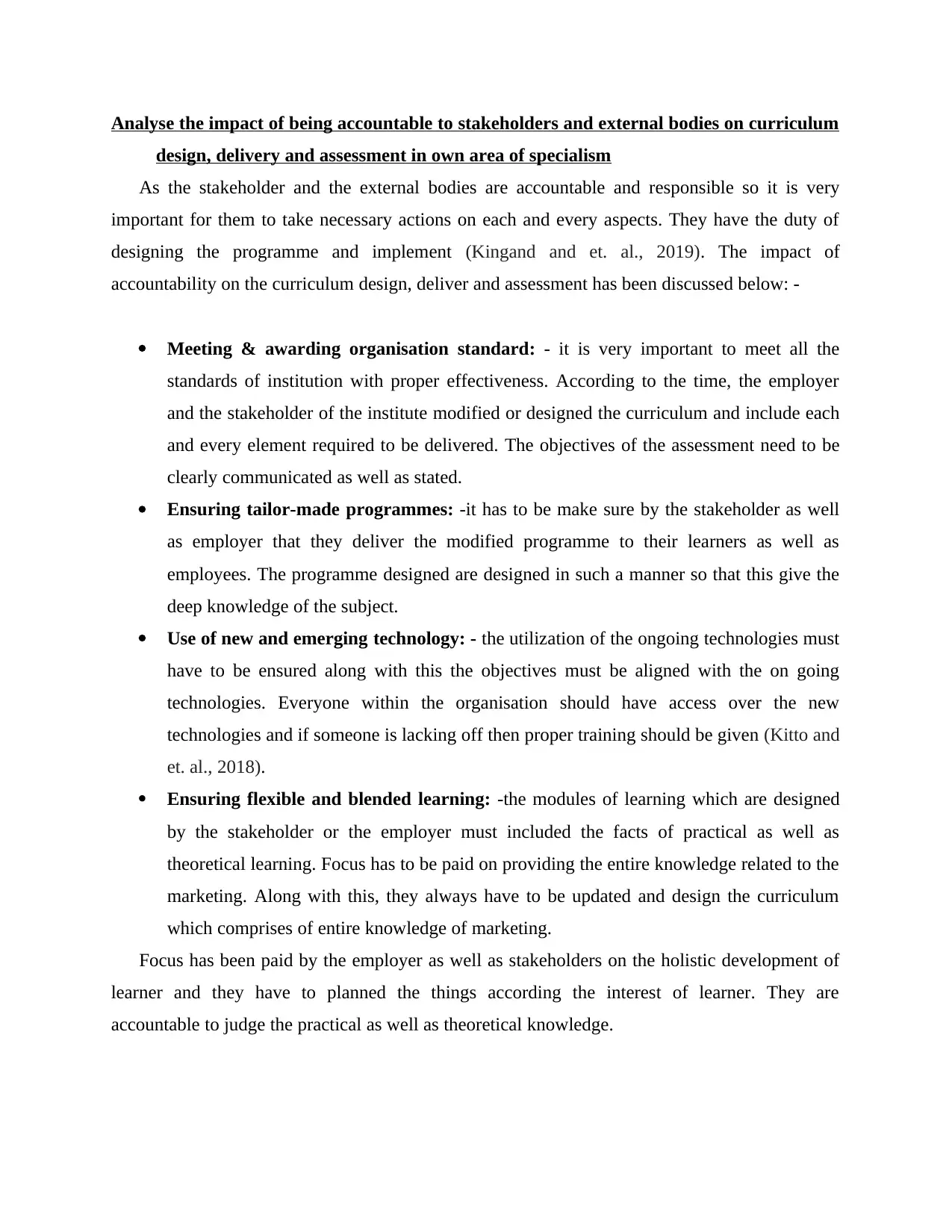
Analyse the impact of being accountable to stakeholders and external bodies on curriculum
design, delivery and assessment in own area of specialism
As the stakeholder and the external bodies are accountable and responsible so it is very
important for them to take necessary actions on each and every aspects. They have the duty of
designing the programme and implement (Kingand and et. al., 2019). The impact of
accountability on the curriculum design, deliver and assessment has been discussed below: -
Meeting & awarding organisation standard: - it is very important to meet all the
standards of institution with proper effectiveness. According to the time, the employer
and the stakeholder of the institute modified or designed the curriculum and include each
and every element required to be delivered. The objectives of the assessment need to be
clearly communicated as well as stated.
Ensuring tailor-made programmes: -it has to be make sure by the stakeholder as well
as employer that they deliver the modified programme to their learners as well as
employees. The programme designed are designed in such a manner so that this give the
deep knowledge of the subject.
Use of new and emerging technology: - the utilization of the ongoing technologies must
have to be ensured along with this the objectives must be aligned with the on going
technologies. Everyone within the organisation should have access over the new
technologies and if someone is lacking off then proper training should be given (Kitto and
et. al., 2018).
Ensuring flexible and blended learning: -the modules of learning which are designed
by the stakeholder or the employer must included the facts of practical as well as
theoretical learning. Focus has to be paid on providing the entire knowledge related to the
marketing. Along with this, they always have to be updated and design the curriculum
which comprises of entire knowledge of marketing.
Focus has been paid by the employer as well as stakeholders on the holistic development of
learner and they have to planned the things according the interest of learner. They are
accountable to judge the practical as well as theoretical knowledge.
design, delivery and assessment in own area of specialism
As the stakeholder and the external bodies are accountable and responsible so it is very
important for them to take necessary actions on each and every aspects. They have the duty of
designing the programme and implement (Kingand and et. al., 2019). The impact of
accountability on the curriculum design, deliver and assessment has been discussed below: -
Meeting & awarding organisation standard: - it is very important to meet all the
standards of institution with proper effectiveness. According to the time, the employer
and the stakeholder of the institute modified or designed the curriculum and include each
and every element required to be delivered. The objectives of the assessment need to be
clearly communicated as well as stated.
Ensuring tailor-made programmes: -it has to be make sure by the stakeholder as well
as employer that they deliver the modified programme to their learners as well as
employees. The programme designed are designed in such a manner so that this give the
deep knowledge of the subject.
Use of new and emerging technology: - the utilization of the ongoing technologies must
have to be ensured along with this the objectives must be aligned with the on going
technologies. Everyone within the organisation should have access over the new
technologies and if someone is lacking off then proper training should be given (Kitto and
et. al., 2018).
Ensuring flexible and blended learning: -the modules of learning which are designed
by the stakeholder or the employer must included the facts of practical as well as
theoretical learning. Focus has to be paid on providing the entire knowledge related to the
marketing. Along with this, they always have to be updated and design the curriculum
which comprises of entire knowledge of marketing.
Focus has been paid by the employer as well as stakeholders on the holistic development of
learner and they have to planned the things according the interest of learner. They are
accountable to judge the practical as well as theoretical knowledge.
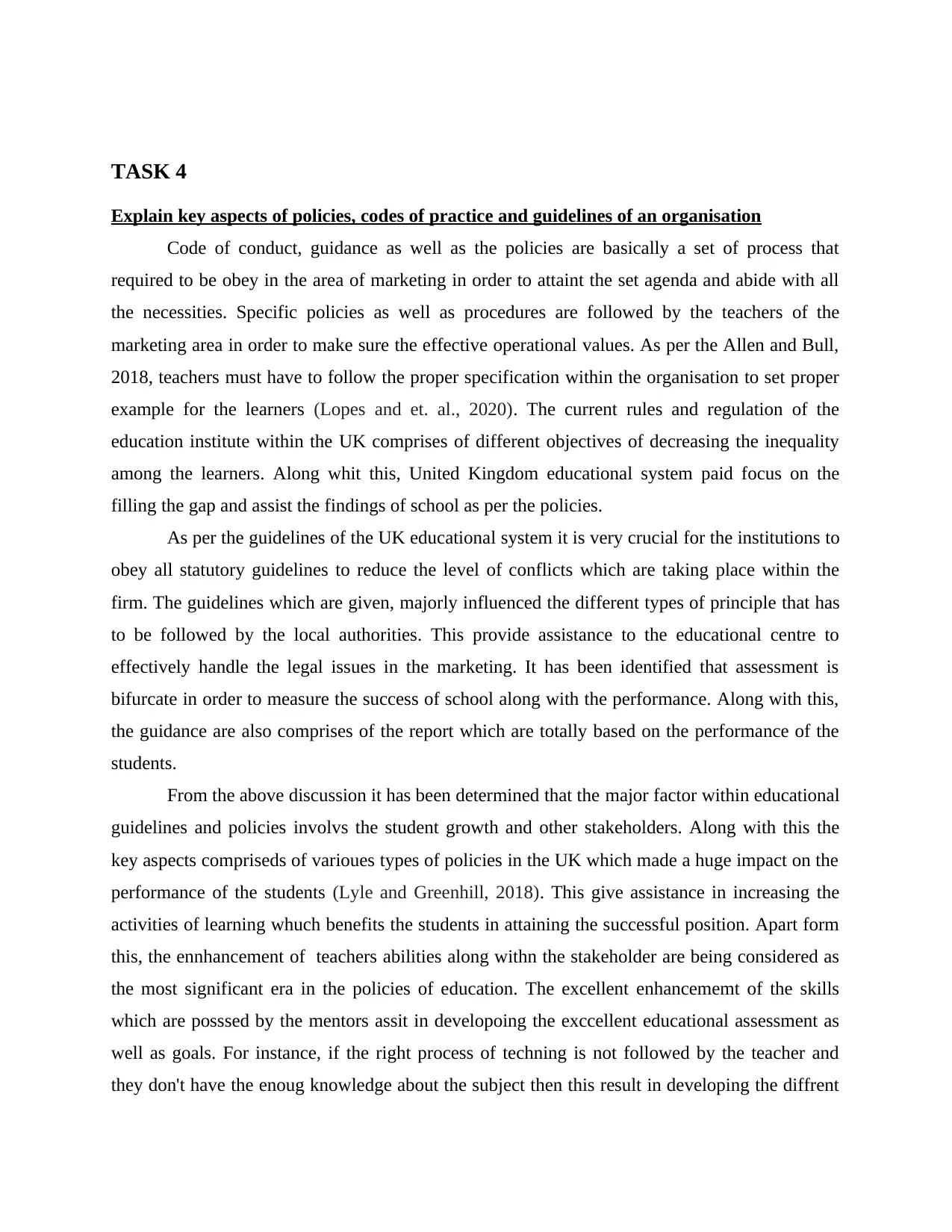
TASK 4
Explain key aspects of policies, codes of practice and guidelines of an organisation
Code of conduct, guidance as well as the policies are basically a set of process that
required to be obey in the area of marketing in order to attaint the set agenda and abide with all
the necessities. Specific policies as well as procedures are followed by the teachers of the
marketing area in order to make sure the effective operational values. As per the Allen and Bull,
2018, teachers must have to follow the proper specification within the organisation to set proper
example for the learners (Lopes and et. al., 2020). The current rules and regulation of the
education institute within the UK comprises of different objectives of decreasing the inequality
among the learners. Along whit this, United Kingdom educational system paid focus on the
filling the gap and assist the findings of school as per the policies.
As per the guidelines of the UK educational system it is very crucial for the institutions to
obey all statutory guidelines to reduce the level of conflicts which are taking place within the
firm. The guidelines which are given, majorly influenced the different types of principle that has
to be followed by the local authorities. This provide assistance to the educational centre to
effectively handle the legal issues in the marketing. It has been identified that assessment is
bifurcate in order to measure the success of school along with the performance. Along with this,
the guidance are also comprises of the report which are totally based on the performance of the
students.
From the above discussion it has been determined that the major factor within educational
guidelines and policies involvs the student growth and other stakeholders. Along with this the
key aspects compriseds of varioues types of policies in the UK which made a huge impact on the
performance of the students (Lyle and Greenhill, 2018). This give assistance in increasing the
activities of learning whuch benefits the students in attaining the successful position. Apart form
this, the ennhancement of teachers abilities along withn the stakeholder are being considered as
the most significant era in the policies of education. The excellent enhancememt of the skills
which are posssed by the mentors assit in developoing the exccellent educational assessment as
well as goals. For instance, if the right process of techning is not followed by the teacher and
they don't have the enoug knowledge about the subject then this result in developing the diffrent
Explain key aspects of policies, codes of practice and guidelines of an organisation
Code of conduct, guidance as well as the policies are basically a set of process that
required to be obey in the area of marketing in order to attaint the set agenda and abide with all
the necessities. Specific policies as well as procedures are followed by the teachers of the
marketing area in order to make sure the effective operational values. As per the Allen and Bull,
2018, teachers must have to follow the proper specification within the organisation to set proper
example for the learners (Lopes and et. al., 2020). The current rules and regulation of the
education institute within the UK comprises of different objectives of decreasing the inequality
among the learners. Along whit this, United Kingdom educational system paid focus on the
filling the gap and assist the findings of school as per the policies.
As per the guidelines of the UK educational system it is very crucial for the institutions to
obey all statutory guidelines to reduce the level of conflicts which are taking place within the
firm. The guidelines which are given, majorly influenced the different types of principle that has
to be followed by the local authorities. This provide assistance to the educational centre to
effectively handle the legal issues in the marketing. It has been identified that assessment is
bifurcate in order to measure the success of school along with the performance. Along with this,
the guidance are also comprises of the report which are totally based on the performance of the
students.
From the above discussion it has been determined that the major factor within educational
guidelines and policies involvs the student growth and other stakeholders. Along with this the
key aspects compriseds of varioues types of policies in the UK which made a huge impact on the
performance of the students (Lyle and Greenhill, 2018). This give assistance in increasing the
activities of learning whuch benefits the students in attaining the successful position. Apart form
this, the ennhancement of teachers abilities along withn the stakeholder are being considered as
the most significant era in the policies of education. The excellent enhancememt of the skills
which are posssed by the mentors assit in developoing the exccellent educational assessment as
well as goals. For instance, if the right process of techning is not followed by the teacher and
they don't have the enoug knowledge about the subject then this result in developing the diffrent
⊘ This is a preview!⊘
Do you want full access?
Subscribe today to unlock all pages.

Trusted by 1+ million students worldwide
1 out of 20
Related Documents
Your All-in-One AI-Powered Toolkit for Academic Success.
+13062052269
info@desklib.com
Available 24*7 on WhatsApp / Email
![[object Object]](/_next/static/media/star-bottom.7253800d.svg)
Unlock your academic potential
Copyright © 2020–2025 A2Z Services. All Rights Reserved. Developed and managed by ZUCOL.

